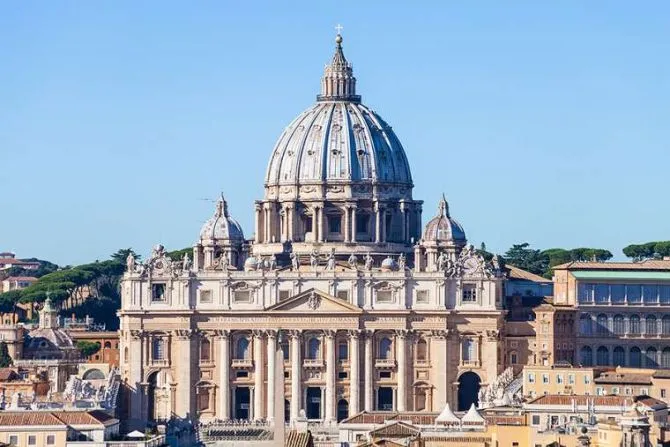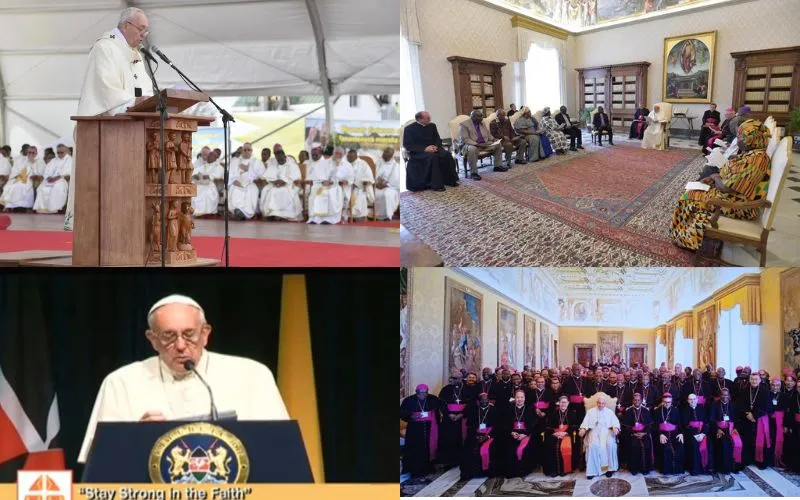“It is precisely in this context that one can understand the possibility of blessing couples in irregular situations and same-sex couples without officially validating their status or changing in any way the Church’s perennial teaching on marriage,” Fernández wrote in the text’s introductory note.
The declaration, which was reviewed and signed by Pope Francis, offers “new clarifications” on the DDF’s 2021 guidance on the topic.
The DDF said its new guidance is in continuity with the 2021 text because the previous guidance applied only to “liturgical blessings,” which require “that what is blessed be conformed to God’s will, as expressed in the teachings of the Church.”
Because of the Church’s clear teaching that sexual relations only “find their natural, proper, and fully human meaning” in the “exclusive, stable, and indissoluble union between a man and a woman,” the DDF underscores that “when it comes to blessings, the Church has the right and duty to avoid any rite that might contradict this conviction or lead to confusion.”
Liturgical vs. pastoral
(Story continues below)
But the DDF states that blessings should not be reduced to the liturgical “point of view alone.”
“Indeed, there is the danger that a pastoral gesture that is so beloved and widespread will be subjected to too many moral prerequisites, which, under the claim of control, could overshadow the unconditional power of God’s love that forms the basis for the gesture of blessing.”
With regard to these less formalized blessings, the Church “must shy away from resting its pastoral praxis on the fixed nature of certain doctrinal and disciplinary schemes,” the DDF says.
“Thus, when people ask for a blessing, an exhaustive moral analysis should not be placed as a precondition for conferring it. For, those seeking a blessing should not be required to have prior moral perfection.”
The DDF also describes blessings “outside of a liturgical framework” as part of a “realm of greater spontaneity and freedom” that, while optional, are a valuable “pastoral resource.”
In a passage that reflects on the use of blessings in Scripture, the DDF states that the practice is “a positive message of comfort, care, and encouragement. The blessing expresses God’s merciful embrace and the Church’s motherhood, which invites the faithful to have the same feelings as God toward their brothers and sisters.”
A person who asks for a blessing, the DDF said, indicates that he is “in need of God’s saving presence in his life, and one who asks for a blessing from the Church recognizes the latter as a sacrament of the salvation that God offers.”
“Such blessings are meant for everyone,” the DDF states. “No one is to be excluded from them.”
Pastoral blessings of same-sex couples
“Within the horizon” of the pastoral understanding of blessings, the DDF states that there is “the possibility of blessings for couples in irregular situations and for couples of the same sex.”
This understanding of blessings “may suggest that the ordained minister join in the prayer of those persons who, although in a union that cannot be compared in any way to marriage, desire to entrust themselves to the Lord and his mercy, to invoke his help, and to be guided to a greater understanding of his plan of love and of truth.”
The DDF states that couples seeking a blessing from God in this context “do not claim a legitimation of their own status” but instead ask that “all that is true, good, and humanly valid in their lives and their relationships be enriched, healed, and elevated by the presence of the Holy Spirit.”
Guidance for blessings
The declaration offers several qualifications for blessing same-sex couples and those in “irregular situations” in order “to avoid producing confusion with the blessing proper to the sacrament of marriage.”
For one, these blessings should be “non-ritualized” and should not be expressed in any formal rite by ecclesial authorities.
“Indeed, such a ritualization would constitute a serious impoverishment because it would subject a gesture of great value in proper piety to excessive control, depriving ministers of freedom and spontaneity in their pastoral accompaniment of people’s lives,” the DDF states, explicitly stating that no one should “provide nor promote a ritual” for such blessings.
Additionally, to “avoid any form of confusion or scandal,” these blessings “should never be imparted in concurrence with the ceremonies of a civil union, and not even in connection with them,” nor with any “clothing, gestures, or words that are proper to a wedding.”
Instead, the DDF envisions that blessings of same-sex couples and those in irregular situations would happen “spontaneously,” suggesting that they could take place in the context of “a visit to a shrine, a meeting with a priest, a prayer recited in a group, or during a pilgrimage.”
The DDF states that with such blessings, “there is no intention to legitimize anything, but rather to open one’s life to God, to ask for his help to live better, and also to invoke the Holy Spirit so that the values of the Gospel may be lived with greater faithfulness.”
The “pastoral sensitivity” of ordained ministers should be formed to offer these kinds of spontaneous blessings, the DDF declared.








